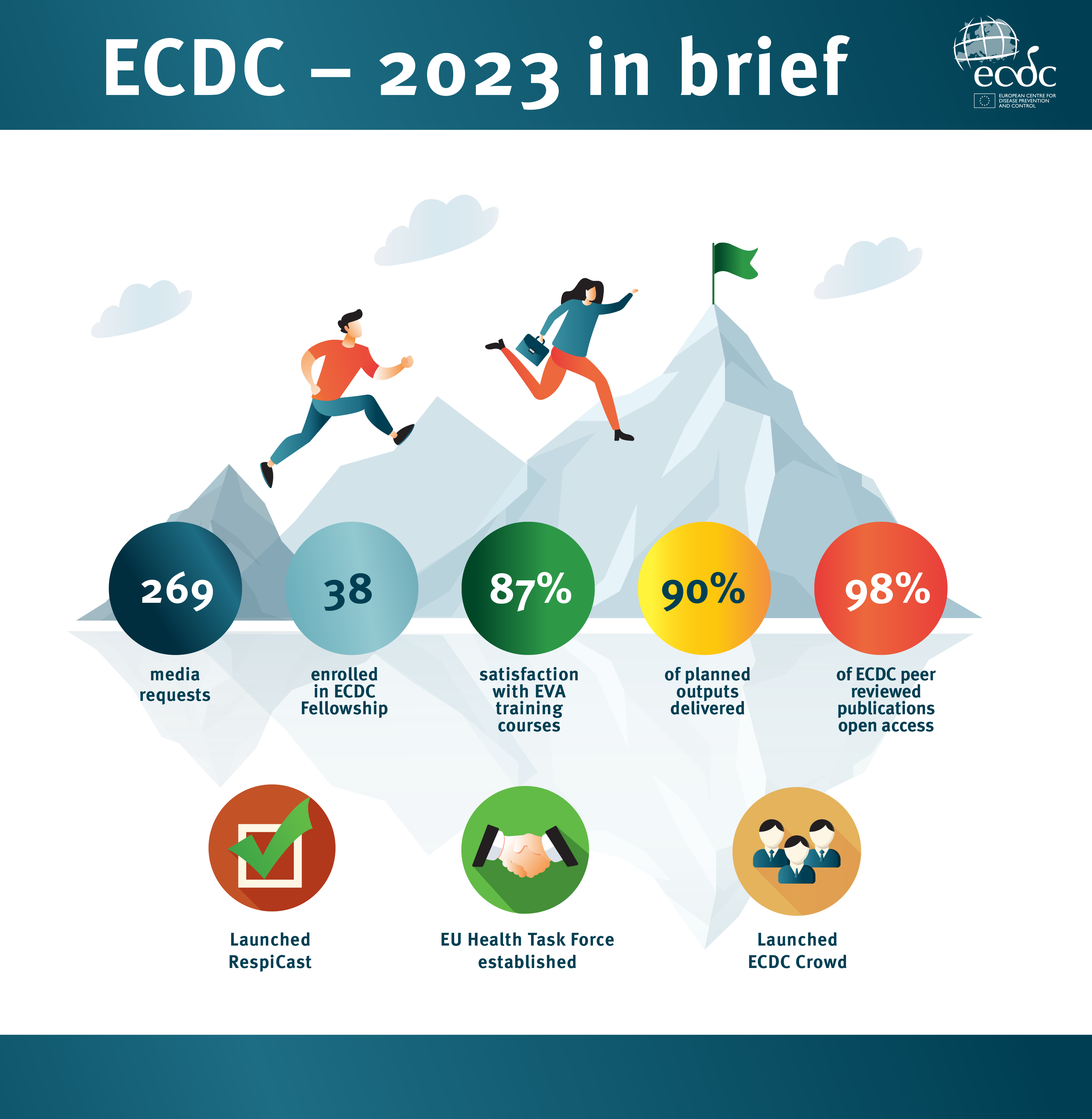Highlights from the Consolidated Annual Activity Report - achievements, challenges and major outputs 2023
These highlights offer a selection of key activities from 2023 but by no means represents the entire range of ECDC’s accomplishments during that year. A detailed look at ECDC’s range of activities, its organisational and administrative structures, and its work plan can be found in the full version of the Annual Report.

2023 represented a significant change in ECDC’s work following the COVID-19 pandemic. It was the first year that the Centre was not in crisis operation mode, enabling it to focus on implementing its strengthened mandate, adopting a new forward-looking strategy and enhancing its work in surveillance, external cooperation and foresight. Much of this work was informed by lessons learned during the pandemic and will help the Agency to become stronger and more efficient.
ECDC’s new strategy contains five strategic objectives that will guide the efforts of the Centre through 2023 and beyond:
- Strengthen and apply scientific excellence to all ECDC activities and outputs to inform public health policy and practice.
- Support the countries to strengthen their capacities and capabilities to make evidence-based decisions on public health policies and practices.
- Prepare for the future through foresight and innovation assessments.
- Increase health security in the EU through strengthened cooperation and coordination between ECDC and partners in non-EU countries.
- Transform the organisation to the next generation ECDC through streamlined processes, enhanced staff engagement and satisfaction, to maximise the visibility and accessibility of ECDC's outputs.
ECDC’s strengthened mandate and the array of unprecedented global challenges to delivering the Centre’s new mission have increased expectations in terms of the tasks and interventions incumbent on ECDC. The amended ECDC Founding Regulation not only defines the legal basis for the activities that became a priority following the COVID-19 outbreak, but it also introduces new areas of focus for ECDC interventions. Throughout 2023, the Centre continued to implement its new, strengthened mandate.
In 2023, ECDC delivered 90% of the outputs planned in its Single Programming Document 2023–2025. In all, only 5% of the planned outputs were postponed, and 4% were cancelled, not implemented, delayed or not applicable by the end of the year.
The Centre also revised its list of notifiable diseases and their case definitions to help strengthen Europe’s surveillance, making it more resilient during a pandemic. In addition, EUR 97.3 million was allocated to Member States through the EU4Health programme to strengthen national surveillance systems.
In line with its enhanced mandate and revised strategy, ECDC launched RespiCast, an extension of the successful European COVID-19 Forecast Hub. RespiCast combines multiple forecasting hubs for several respiratory disease indicators, including influenza-like-illness, acute respiratory infections, and indicators related to COVID-19.
At the end of 2023, ECDC finalised preparatory work for the EU Health Task Force and worked with the Member States to decide on the structure and practicalities of the Serious Cross Border Health Threats Regulation Article 8 country visits. These visits will enhance ECDC’s visibility and impact both within Europe and beyond.
Foreword by the Chair of the Management Board

It is my great pleasure to introduce the ECDC Consolidated Annual Activity Report 2023, which summarises the work carried out by ECDC with special focus on the strengthened mandate of the Agency.
Let me recall the rationale for the creation of the European Health Union: the Member States and all EU institutions, including the European Parliament, different Directorates-General (DGs) and relevant EU Agencies, should work together, especially during public health crises. The success of the European Health Union is therefore based on collaboration and coordination of actions and it is vital to ensure that the responsibilities of each of the players are clear, so that activities are well coordinated, rather than duplicated.
One of the most challenging aspects of implementing the amended ECDC Founding Regulation and the Regulation on Serious Cross Border Threats to Health is to ensure that the necessary processes are in place at ECDC. The MB continued to support this endeavour throughout 2023, based on regular collaboration and dialogue with ECDC, and work is foreseen to continue in 2024. In implementing its strengthened mandate, ECDC will have a more prominent role in global health. The Agency will be more active in providing hands-on support for preparedness and response activities through the European Health Task Force (EUHTF), as well as further reinforcing its existing collaboration with WHO’s Regional Office for Europe, the partnership with Africa’s CDC and the network of major CDCs.
Nevertheless, ECDC will face inherent challenges when implementing consequential changes for its transformation as an organisation, in line with its strategic vision. The ECDC Transformation Programme, ASPIRE (Anticipate, Support, Prepare, Inform, Respond, Empower) was developed to raise awareness of the implications of the strengthened mandate and its future impact. ASPIRE represents a solid foundation that will transform the Centre at various levels by improving ECDC’s visibility, ways of working, competencies and values, taking it to the next level.
As Chair of the Management Board, I would like to draw your attention to certain concrete elements of ECDC’s work in 2023, which will have far-reaching implications for the future. During its 57th meeting in March 2023, the Amended ECDC Strategy 2021−2027 was presented to the Management Board (MB) for discussion. The MB had already agreed with the overall structure of the strategy, namely the five Strategic Objectives (SOs) and the Action Areas. It was further agreed to extend the mandate of the MB Working Group to review and assess the alignment of ECDC strategic documents (Amended ECDC Strategy 2021−2027 and ECDC Strategy Implementation Roadmap 2021−2027) with the EU Health Union legal texts through 2023. The discussions which took place in the MB Working Group were very valuable, in particular the reflections on the ongoing PESTEL analysis that examines the political, economic, social, technological and legal environment in which ECDC operates. The amended document was subsequently approved at the 58th meeting of the MB in June.
During its 58th meeting, the MB also discussed the proposed priorities for the Single Programming Document 2025 and the action plan arising from the Stakeholder Satisfaction Consultation, carried out in 2022.
During its 59th meeting in November, the Revised ECDC Strategy Implementation Roadmap 2021−2027 was presented to the MB and endorsed in a written procedure following the meeting. The high-level document is a tool to provide guidance and facilitate the annual planning process. It defines what needs to be done at what point in time to achieve each of the strategic objectives in the Amended ECDC Strategy 2021−2027 and contains agreed milestones for the implementation of the new tasks arising from the revised ECDC Founding Regulation.
The implementation of the 2023 work programme had advanced in all areas of the Centre’s work, and ECDC delivered 90% of the outputs planned in its Single Programming Document 2023−2025 (with 5% of the planned outputs postponed, and 4% cancelled, delayed, not implemented or not applicable by the end of the year). ECDC’s Director convened meetings with the Directors and National Coordinators of the Coordinating Competent Body (CCB) in order to better understand the actual needs of the countries and to tailor the appropriate support to meet their needs and expectations. Furthermore, the Agency increased the impact of its support by deploying communicable disease/public health experts to the countries, as required.
Throughout 2023, the Management Board convened a number of closed sessions to discuss the timeline and process for the selection of a new ECDC Director 2024−2029, including the draft vacancy notice. It is anticipated that the new Director will take up the post in June 2024.
Finally, I would like to take this opportunity to thank my fellow Board members for their valuable and insightful contributions during the ECDC MB meetings. I also wish to express my profound gratitude to ECDC staff for their invaluable collaborative work in public health, and for embracing emerging challenges and opportunities. With our strong foundation, let us continue to be inspired in our shared quest to improve lives across Europe and globally.
Dr Anni-Riitta Virolainen-Julkunen
Chair of ECDC Management Board
26 February 2024

Let me commence by expressing my deep gratitude to colleagues and partners in the Member States (and beyond!) for their dedication and enriching dialogue throughout 2023. I also wish to thank all ECDC staff for their determination and enthusiasm throughout the year.
Beyond a shadow of a doubt, 2023 represented a year of uncertainties in Europe and globally: the continued war waged by Russia on Ukraine, the armed conflict between Israel and Hamas-led Palestinian militant groups, worldwide apocalyptic weather events, ranging from historic wildfires to extreme drought and record flooding, global democratic recession, and rising inflation, all having a far-reaching impact on humanity.
This Consolidated Annual Activity Report (CAAR) outlines the work conducted by ECDC in 2023 and provides a good overview of the Centre’s achievements, as set out in the Single Programming Document 2023−2025. What stands out is the immense amount of work done internally in preparation for the implementation of the reinforced ECDC mandate. We also continued to explore better ways of working with our key constituencies, as well as holding productive discussions on moving forward through the European Health Task Force (EUHTF), preparedness, and surveillance with CCB directors, national coordinators, and the Management Board.
Throughout 2023, there were several country visits in which the depth and breadth of the reinforced mandate was conveyed, including how its implementation would have an impact on the Centre’s way of working. These visits represented excellent opportunities for hearing the views of the Member States vis-à-vis the implications of the strengthened ECDC mandate for their work, and also the provision of concrete action for support and guidance. Our discussions provided ECDC with an enhanced understanding of the level of joint ambitions, including through the digitalisation of surveillance. Moreover, the Agency was able to tailor envisaged approaches to working optimally with the Member States, the Commission, partners, and other stakeholders. During the year, there were also several high-level visits and a number of events organised in Stockholm, due primarily to the Swedish Presidency but also to ECDC’s increased recognition, stemming from the pandemic. It is noteworthy that in May, for the first time ever, the European Commission agreed to include the Centre as part of the EU delegation at the WHO World Health Assembly.
The strengthened mandate will ultimately require the Agency to take a stronger role in supporting EU countries with the digitalisation of surveillance; enhanced joint preparedness and response planning; the provision of non-binding recommendations and stronger guidance during emergencies; vaccine monitoring; the network of EU reference laboratories for public health; enhanced support through the assistance of a ready-to-deploy EUHTF, as well as a reinforced international role. Our amended Founding Regulation places much more emphasis on hands-on support, based on profound country knowledge. ECDC will continue to reassess its way of engaging with stakeholders to jointly determine the level of ambition and ensure that all ECDC activities are based on well-defined needs and priorities. Given the acute advancement of AI, machine learning, new analytical methods and modelling that will have consequential implications our work, we were pleased to learn of the recent provisional agreement on the proposal for harmonised rules on artificial intelligence (AI). AI can serve to advance surveillance systems through digital solutions to ensure timely, complete, comparable data, including forecasting with different scenarios to influence the future. By embracing new technologies and pooling our existing knowledge innovatively and dynamically through communities of practice, we will accomplish positive, transformative outcomes for public health. With the ensuing accelerated progression of AI, we will need to find an appropriate balance as we navigate our new world of AI systems, while respecting fundamental rights and EU values. During 2023, ECDC established an internal working group on AI to guide its adoption of AI tools and methodologies in a safe way, ensuring that the associated risks are properly identified, understood and mitigated. The public health benefit of different tools will be explored to learn from and to leverage best practices and synergies with our sister agencies and other partners.
There will be many consequential changes in 2024 and 2025 that may impact the work of the Centre. Globally, the new international pandemic treaty and the review of the International Health Regulations (IHR) should be finalised by May 2024, and in force by 2025. Within the EU, notwithstanding the Presidency of the Council of the European Union, a new strategic agenda and priorities for the European Commission will be in place during the autumn, following the European parliamentary elections in June 2024. At ECDC, several vacancies are foreseen to be filled, including that of a new Director, and two new Heads of Unit. The One Health Strategy is also foreseen to be finalised in the first quarter of 2024. In addition, two important evaluations will be carried out: in 2024, the Commission will carry out an evaluation, including an assessment of the operation of the Early Warning and Response System (EWRS) and the epidemiological surveillance network, and in 2025, an external evaluation of the Centre’s activities will be conducted, as defined in Article 31 of the amended ECDC Founding Regulation. This external evaluation, initiated by the Commission, will also examine the feasibility of extending the mandate to address the impact of cross-border threats to health on non-communicable diseases.
In closing, on a more sombre note, let me take this opportunity to pay homage to the passing of John F. Ryan, a dear friend who recently retired from his post as DG SANTE Deputy Director General. John was involved in ECDC from the beginning and served for many years as a member of our Management Board, providing strong support for the Agency. When I became Director, he was a reliable reference for me in all matters EU, and he always found solutions to navigate the complex EU system. John received many public accolades on social media that reflect his unique contribution. It was truly an honour to have worked with John on a number of public health initiatives throughout his years of service. His contribution to ECDC’s work will always be highly appreciated by all of us.
Dr Andrea Ammon
ECDC Director
18 February 2024

Strategic objective 1. Scientific excellence: strengthen and apply scientific excellence in all ECDC’s activities and outputs to inform public health policy and practice.
This strategic objective focuses on the setting and promotion of standards, the provision of evidence and guidance for public health policies and practice, the development and implementation of methodologies to increase the impact of public health actions in the field of communicable disease prevention and control, and the knowledge transfer required to bridge the gap between science, policy and practice.
ECDC’s efforts in 2023 focused on revising public health outputs, enhancing surveillance and response capabilities, improving knowledge management and dissemination, and fostering collaboration and engagement within the public health community.
In 2023, 98% of ECDC publications in peer-reviewed journals were open access, in line with the Centre’s commitment to fair acknowledgement of contributions to its work and outputs and to ensuring that ECDC’s work is disseminated and easily accessible to all EU citizens through its website and open access publication in peer-reviewed journals.
The Centre continued to provide technical support to public health reference laboratory networks across the EU/EEA and to enlargement countries. These activities included External Quality Assessment exercises, training and other capacity-building activities.
ECDC and the European Commission jointly initiated the implementation of new EU reference laboratories to increase public health microbiology capacity in the EU/EEA countries. A call for proposals for six new EU reference laboratories was launched in October 2023. Disease groups covered in these calls included antimicrobial-resistant bacteria, vector-borne viral pathogens, emerging, rodent-borne and zoonotic viral pathogens, high-risk, emerging and zoonotic bacterial pathogens, Legionella, diphtheria and pertussis.
ECDC continued to offer sequencing support to Member States, performing direct sequencing of 19 000 samples of SARS-CoV-2 for surveillance purposes. Sequencing services were also provided to support the investigation of specific events for a variety of infectious diseases.
The Agency continued to strengthen its internal capacities and capabilities in biostatistics and mathematical modelling. In-depth and advanced bio-statistical and mathematical modelling analyses contributed to high-quality technical content for ECDC outputs, such as rapid risk assessments and technical reports. ECDC also launched RespiCast, an extension of the successful European COVID-19 Forecast Hub, which covers several respiratory disease indicators, including influenza-like-illnesses, acute respiratory infections, and indicators related to COVID-19.
ECDC maintained the Scientific Advice Repository and Management System (SARMS) for quality management of outputs and developed a Science Impact Framework to assess the impact of its scientific work. The framework will support the implementation of new outputs and output categories starting in 2024.
ESCAIDE 2023 in Barcelona marked a milestone for ECDC, attracting over 750 in-person attendees and nearly 2 200 online participants from across the EU and 98 other countries. This diverse attendance highlighted our global impact in public health, especially post-COVID-19. The conference’s hybrid format successfully met the evolving needs of public health professionals, offering both accessibility and inclusivity.

Strategic objective 2. Support the countries to strengthen their capacities and capabilities to make evidence-based decisions on public health policies and practices.
Disease-specific work is at the core of fulfilling this strategic objective, with a focus on the prevention of infectious diseases. This strategic objective tackles the use of country information to improve country support, and help reinforce prevention and control programmes, training and emergency preparedness in the EU Member States.
ECDC’s country support activities saw the Centre reinforce its country intelligence capabilities by developing new tools to provide accurate, up-to-date snapshots for Member States. These snapshots cover diseases and health issues, surveillance information, country and health governance, microbiology, preparedness and response to public health emergencies, workforce capacity and digital public health.
This country intelligence is enhanced by regular country visits and tailored support through specific research, guidance and advice, as well as the availability of grants to help strengthen surveillance and prevention and provide training.
ECDC made significant strides in enhancing the prevention and control of communicable diseases across Europe in 2023 from a ‘One Health’ perspective. ‘One Health’ recognises the complex interplay between human, animal and plant health, food safety, the climate crisis and environmental sustainability.
In 2023, ECDC established a One Health Task Force to strengthen collaboration with sister EU agencies and the continued development of the One Health Framework. In collaboration with the European Medicines Agency (EMA), the European Food Safety Authority (EFSA), the European Environment Agency (EEA) and the European Chemicals Agency (ECHA), ECDC established the cross-agency One Health Task Force.
Further integrating behavioural sciences into its work to better support the success of national programmes was also a key element of ECDC’s work in 2023. The Centre developed a draft prevention framework, focusing on social and behavioural sciences, to ensure a more human centric approach to disease prevention that can better engage with the most vulnerable communities across Europe.
A range of training courses and presentations were offered on social and behavioural sciences and qualitative research in the prevention and control of infectious diseases for the ECDC Fellowship Programme (EPIET), The Mediterranean and Black Sea Programme for Intervention Epidemiology Training (MediPIET), the ECDC Summer School, the Health Security Initiative, and the ECDC Observership.
ECDC continued to offer a vast array of training courses for Continuous Professional Development (CPD), including instructor-led and e-learning courses through the ECDC Virtual Academy.

Strategic objective 3. Future outlook: prepare for the future through foresight and innovation assessments.
This strategic objective is focused on applying foresight methods to identify and address knowledge gaps and areas of uncertainty, engaging with EU research and innovation initiatives and supporting transformation by assessing the impact of new technologies and methods.
In 2023, ECDC continued working as part of an EC-funded consortium to pilot the feasibility of carrying out antimicrobial resistance (AMR) surveillance using the European Health Data Space (EHDS) infrastructure.
Epidemic intelligence operations were further strengthened by the transition to Epidemic Intelligence from the Open Sources system, by further improving and automating event detection and exploring the role of artificial intelligence.
ECDC continues to build on work to engage and support EU-level research actors and actions. The Centre continues to assess and make use of new technologies to modernise its approach to surveillance and risk assessment, taking into consideration the infrastructural development fostered by the European Commission and the changes in clinical public health practice in Member States.
At the end of 2023, ECDC launched ECDC Crowd, a platform to pilot the use of crowdsourcing to support evidence synthesis tasks.
ECDC’s preparations for the future include a strategic 2040 foresight programme for which the Centre has developed six threat scenarios and examined how it could react to be able to effectively fulfil its mission in each case.
Strategic objective 4. Increase health security in the EU through strengthened cooperation and coordination between ECDC and partners in non-EU countries.
This strategic objective is delivered through the development and implementation of programmes to support the Western Balkans, Türkiye and European Neighbourhood Policy (ENP) partner countries and to ensure collaboration and coordination with major centres for disease prevention and control, international partners and EU institutions towards the achievement of common objectives.
In 2023, ECDC continued to further strengthen its coordination and collaboration with key partners, both at EU and global level.
With external financial assistance from the European Commission Directorate-General for Neighbourhood and Enlargement Negotiations (DG NEAR), ECDC continued to implement the project ‘Preparatory measures for the participation of the Western Balkans and Türkiye in the European Centre for Disease Prevention and Control with special focus on One Health against AMR and enhanced SARI surveillance, 2020–2024’.
In order to support national authorities on serious cross-border threats to health by strengthening surveillance, preparedness, and microbiology laboratory system capacities supporting public health, experts from countries funded by the Instrument of Pre-Accession Assistance (IPA) were invited to participate as observers in ECDC national focal point forums and meetings. A total of 181 experts from the Western Balkans and Türkiye attended 24 meetings during 2023, including seven capacity-building events.
In 2023, ECDC organised several training courses for MediPIET and implemented a wide range of bilateral and regional activities in both eastern and southern Neighbourhood countries.
ECDC also launched a programme for the exchange of experts. In total, eight exchanges took place, covering various disease programmes. This provided opportunities for Tunisia and Belgium to discuss surveillance of Creutzfeldt–Jakob disease, Greece and Lebanon to share experiences on Legionella surveillance, Bulgaria and Armenia to focus on the prevention of food- and waterborne disease outbreaks, and for Cyprus and Egypt to explore the topic of HIV infection in connection with the movement of populations in the Eastern Mediterranean.

Strategic objective 5. Transform the organisation to the next generation ECDC.
This strategic objective focuses on increasing organisational effectiveness and efficiency, ensuring staff engagement and enhancing the transparency, visibility and availability of ECDC’s outputs.
ECDC continued to grow in 2023, with a total of 55 posts filled during the year. However, despite the high number of recruitments, the Centre managed to keep the vacancy rate well below the 5% target by the end of 2023, with only 1.8 % of the temporary agent posts vacant. With a new strategy being implemented, many new staff having entered the organisation, internal staff in new posts, and a hybrid way of working, a staff retreat was arranged to bring staff together to discuss the future.
The ‘People@ECDC’ framework was also introduced. This framework will guide the modernisation and consolidation of ECDC’s human resources management services and activities in the years to come, with particular focus on staff’s health and well-being, professional development, and further steps to ensure that ECDC is a diverse and inclusive workplace. A 360-degree feedback exercise took place, involving all managers and staff in the Centre, the outcome of which will guide the establishment of a management development programme during 2024.
While ECDC continued to receive attention in the media, social media and through its websites, a reduction in some communication indicators was noted as a natural result of the evolution of the COVID-19 pandemic and other public health issues during the period 2020−2022. Nevertheless, all indicators remained higher than pre-pandemic levels.
In 2023, ECDC continued to engage with journalists across the EU and internationally regarding topics such as AMR, avian influenza, mosquito-borne diseases, sexually transmitted infections, HIV and vaccination. The Centre also held seven press conferences with journalists participating from most EU/EEA countries. These press conferences focused on topics such as tuberculosis, prevention and control of infectious diseases among people who inject drugs, measles, polio, mosquito-borne diseases, respiratory viruses, AMR and HIV/AIDS.
European Antibiotic Awareness Day (EAAD) was marked on 20 November 2023 with a digital campaign and in partnership with the World AMR Awareness Week. A digital event was held on 17 November, involving more than 480 participants and bringing together experts from the human and animal health sectors, as well as representatives from patient and professional organisations. The focus of the 2023 campaign was on the AMR targets for 2030, established in the recently adopted Council Recommendation on stepping up EU actions to combat antimicrobial resistance in a One Health approach.
Training courses with a risk communication component were also implemented as part of the EU Initiative on Health Security and the ECDC Fellowship Programme training module on management, leadership and communication in public health. These training courses included a theoretical base, and placed the participants in scenarios where they needed to apply key risk communication principles to address a wide number of target groups.







